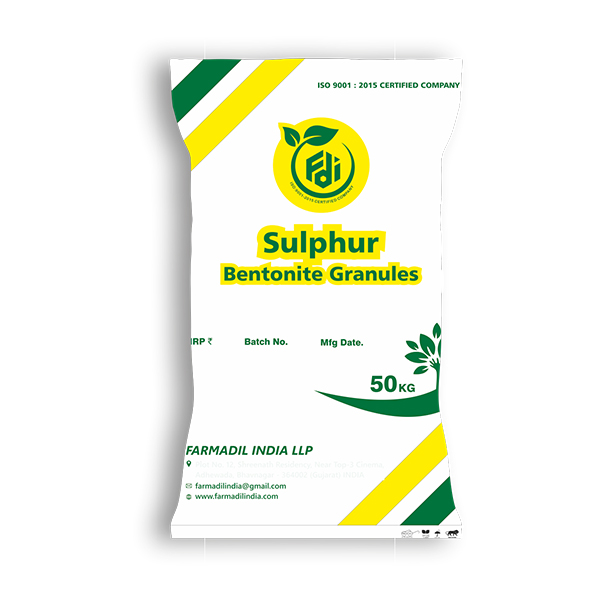Sulphur Bentonite Granule
- Sulphur Bentonite is a combination of pure sulphur and Bentonite Powder it is available in Granular Form.
- It is used as a secondary nutrient and also to correct alkaline soil problems.
- Sulphur is one of the 17 essential plant nutrients and it helps in the formation of essential enzymes and plant proteins.
- It is essential for the growth and development of all crops, without exception.
Like any essential nutrient, sulphur also has some key functions in plants:
- Formation of chlorophyll that permits photosynthesis through which plants produce starch, sugars, oils, fats, vitamins and other compounds.
- Protein production. Sulphur is a constituent of three S-containing amino acids (cysteine, cystine and methionine), which are the building blocks of protein. About 90% of plant S is present in these amino acids.
- Synthesis of oils. This is why adequate sulphur is so crucial for oilseeds.
- Activation of enzymes, which aid in biochemical reactions in the plant.
- Increases crop yields and improves produce quality, both of which determine the market price a farmer would get for his produce.
- With reference to crop quality, S improves protein and oil percentage in seeds, cereal quality for milling and baking, marketability of dry coconut kernel (copra), quality of tobacco, nutritive value of forages, etc.
- It is associated with special metabolisms in plant and the structural characteristics of protoplasm.
Sulphur Deficiency Sources and Symptoms
- Sulphur deficiency symptoms resemble nitrogen deficiency: the leaves become pale-yellow or light green. Unlike nitrogen, sulphur-deficiency symptoms appear first on the younger leaves, and persist even after nitrogen application
Dosage
- Sulphur Bentonite should be applied directly to the soil at the time of sowing or in standing crops.
- For oilseed and pulse crops in dosages of 15 KG/acre should be applied and 10kg/acre should be used for Cereal crops, whereas, for fruits and vegetables crops 10-12kg/acre is the recommended amount of dosage.


